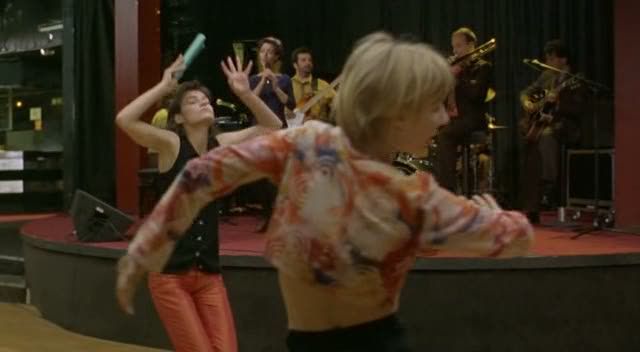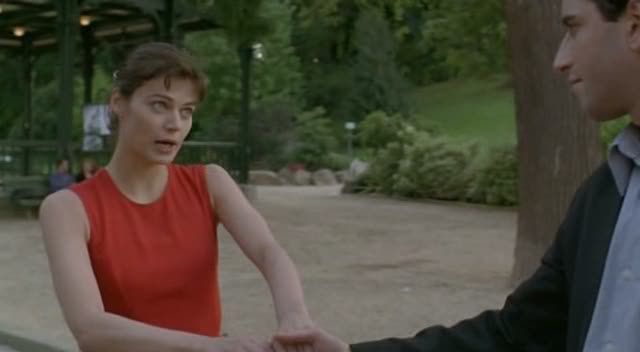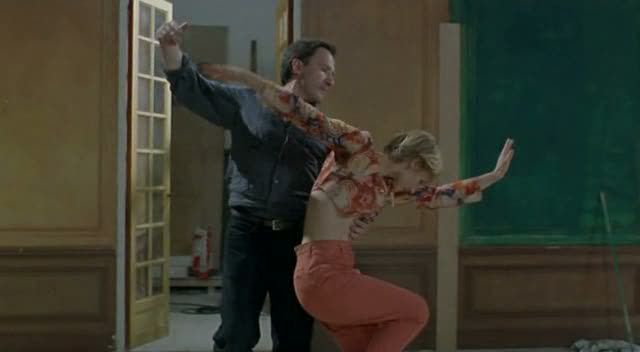
The films of Jacques Rivette often revolve around mysteries and secrets, around conspiracies and secret societies, the past hovering with foreboding over the present, his characters involved in labyrinthine plots that lead to places beyond understanding. Haut bas fragile is no exception, centered as it is on three young women whose lives are seemingly haunted by the past, by the secrets that linger all around them. Louise (Marianne Denicourt) has just awoken from a 5-year coma, and is determined to start a new life while pushing aside everything (boyfriend, family) that occupied her before her prolonged and involuntary absence from the world. Ida (Laurence Côte) was adopted as a child and is obsessed with finding out the identities of her biological parents, hoping that this knowledge will tell her something about her own identity. And Ninon (Nathalie Richard) is fleeing a life of violence that's shown in the opening scenes of the film, when a jealous ex stabs a man who she's dancing with at a club. These women, whose paths cross in ways both major and incidental over the course of the film, are all struggling to determine the courses of their own lives against the inertia of the past, simultaneously seeking the truth about the past and trying to break free of its influence.
This is a common theme in the cinema of Rivette, this concern for the past, a theme that echoes through works like Secret Défense and The History of Marie and Julien, both films where history is a trap, a pattern that dooms the protagonists to cycles of repetition. In Haut bas fragile, however, this trap is continually sidestepped and defused, most notably through music and dance. The film is a musical — or at least, it increasingly becomes one, as the scenes of muscial interruption and performance become more and more frequent over the course of the narrative, transforming what had at times threatened to become a portentous drama into a playful subversion of this drama. Whenever the characters fight or argue, as they often do, their movements become formalized and graceful, striking poses in the midst of the fight, extending their limbs and becoming cat-like in their motion, until the music suddenly erupts and the argument has become a dance, often a dance of flirtation and seduction. It's through the dance, through music and movement, that the characters in the film fall in love and forge friendships, dancing around each other even as Rivette's camera, a playful third partner in these dances, dances around the actors.
This is a charming, exciting film, one in which Rivette lightly prods at some of his typical concerns. He introduces, as he often does, a secret society of sorts, a club that meets in an underground lair to play a sinister game of cards, presided over by the suave and mysterious Alfredo (Wilfred Benaïche). The game is a game of life and death, where one card dictates the killer and another card decides the victim in a real-life game of stalking and murder, a game that recalls Robert Altman's bizarre sci-fi film Quintet. But when Louise — who has infiltrated this mysterious circle through the help of the ubiquitous Roland (André Marcon) — draws the card of the killer, the game turns out to be a farce, a ruse designed to help her overcome her vertigo. The conspiracy dissipates like so much smoke, whereas in so many of Rivette's other films, the conspiracy — and the doubt over whether it exists or not — dominates the action and becomes an obsession for the protagonists. Louise's affliction is probably no coincidence, either, given Rivette's admiration for Hitchcock: whereas Scotty in Vertigo must undergo repeated traumas and psychological torture because of his vertigo, Louise overcomes hers in a few moments through a game. It's a conscious subversion of the thriller's psychosexual dimensions. Again and again, the playfulness of dancing and loving and verbal sparring — like the rhymes of Louise and Ninon's song as they celebrate their newly forming friendship — frees the characters from the constraints of generic drama.


Rather than becoming trapped in cycles of distrust and betrayal, these characters open up new possibilities through the seductiveness and goofiness of dance. The result is a series of happy reversals that send the film careening wildly away from the tragic course that it occasionally seems to be on. Ninon's thievery has short-term bad consequences for one ancillary character, but when she reappears later in the film, she's in a better situation than ever, happier than ever. It's as though Rivette is suggesting that tragedy need not be a permanent condition, and that the story of a life is exactly what we make of it. Thus, though much of the film's narrative is built around a sheaf of papers that provide incriminating evidence about Louise's father, these ultimately turn out to be something of a red herring. The papers threaten to shatter Louise's relationship with her earnest young suitor Lucien (Bruno Todeschini), but instead she doesn't allow the papers' revelations to disturb her; they're part of the past, part of a history that she's moving away from. The real purpose of the papers, in the end, is to provide an excuse for Ninon and Louise to meet, to go off in secret momentarily, and then to emerge, dancing and playful, Ninon twirling around her friend as Louise sways to the music and strikes silly poses as though caught in the flash of a camera. And Rivette's camera, for its part, spins slowly around the women as well, adding its own spiraling inertia to their graceful dance.
This film is a typically slippery and ambiguous delight from Rivette, a mystery whose solution lies, not in the revelation of secrets, but their submersion within an alternate narrative of love, flirtation, and affectionate friendship. It is, as with so many of Rivette's films, a celebration of femininity, where the attempts of the men to control and protect the women, to dictate the direction of the story, prove utterly inconsequential. Ninon and Louise, bonding over a shared distrust of Roland — whose intersections with all three women drive much of the narrative — joke about cooking and eating him, a reversal of the traditional conception of predator and prey. Roland and Lucien attempt to follow, to stalk, to track down these women, but in the process the women turn the tables, rejecting the conspiracies and lies of the men in favor of openness and seduction and the vitality of the dance. These are the positive, exuberant forces at the center of Haut bas fragile, which is packed with Rivette's sly wit and playfully experimental spirit.
Though seemingly as "audience friendly" as Celine and Julie Go Boating, Haut/Bas/Fragile is Rivette's most delicately obscure work, IMO. Part of this has to do with the fact that we don't get any musical numbers until well after the midway point. The other has to do with Rivette's taste for anti-climactical climaxes.
ReplyDeletePrimarily this is a film about Natalie Richard -- much the way the Secret Defense is a film about Sandrine Bonnaire.
Before shooting began he sat the whole cast down to look at Give a Girl a Break -- a marvelous, terribly underrated MGM musical that Stanley Donen directed right after Singin' in the Rain. Donen was contracturaly obligated to do it, and has never cared for it very much in that had no room for any of the experimentation he'd just accomplished. Still it has a great Harry Warren / Ira Gershwin score, and Bob Fosse and Debbie Reynolds make for a lovely song and dance team. "In Our United State" (with bursting balloons and trick photography involving running the film backwards a la Jean Cocteau)is the best number.
The anti-climactic climaxes pretty much define this film, as each story ends just before its seeming natural resolution, or, as Ida flees from the house of her maybe-mother, backs away from the resolution to leave the mystery hanging. Rivette always prefers a good mystery to a solution. And I think almost all of his films could be described as being "about" the actresses in them rather than the nominal plot. Rivette always seems more interested in the cadences, body language, expressions, and personalities of his actresses than in whatever narrative framework is erected around her.
ReplyDeleteThe Donen film sounds like a good reference point. I love the casual way that the song-and-dance numbers emerge in this film, a natural extension of the seemingly unforced movements of the characters through their environments, movements that just suddenly become dance.
Rivette treats plot as a pretext for character. Out 1 (his masterpiece) revolves around an unsolved mystery. It's clear from the start we're never going to "get to the bottom of this" as we would in a conventional film, yet we're enraptured anyway by Leaud, Berto, Ogier, Michel Londsdale and Hermione Karaheuz.
ReplyDeletehey there
ReplyDeletei've read some of your blogs
I think they're fantastic and this is a great review.
I'm fifteen and am attempting and at the moment epically failing to start a film blog of my own.
so far I have a massive following of 7 which includes myself and my sister
I'm currently doing a piece on the films of Quentin Tarantino who i think is a brilliant genre-blending if occasionally empty director
i'll definetly be recommending this blog to all my friends and small following
feel free to check mine out if you've got the time
cheers
Wonderful film, just superb. It's odd, after it ended I went back to the early scenes involving the "orphan", and by what she says it seems as if her having no parents is false. At first I thought "OK, she sends letters to herself from her imaginary parents", but no, I think Rivette's letting us know she's inventing a past (she says something to herself in the mirror to this effect) and a destiny to discover her lineage. Another performance/mystery.
ReplyDeleteYour review is spot-on, though.
By the way, I didn't realise before, but I've visited this blog many times in the past and have always admired it. And now you visit the Corrie! What led you to the forum?
Thanks, Trip, I think you're probably right about the "orphan," Rivette likes to play those kinds of games. And he likes characters who play those games too, people who get creative with the substance of their own lives. After all, such creative make-believe is what most of his films are about, when you get right down to it.
ReplyDeleteI don't remember where I stumbled across a link to Corrierino, but it seemed like a cool forum, so I signed up. Quite a concentration of very knowledgeable film fans there.